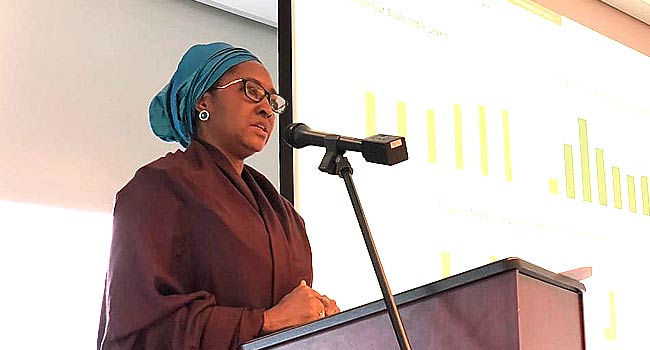The Minister of Finance and National Planning, Zainab Ahmed, yesterday queried the N3.3 trillion personnel cost in the 2020 appropriation bill, stating that it was a mismatch when compared to the N2.1 trillion voted for capital projects.
Speaking at the budget defence of the ministry in Abuja, she noted that the situation portrays the country as one that is averse to development yet with huge appetite for consumption.
Her words: “We have a national problem of low productivity especially within government. Our personnel cost in the 2020 budget proposal is N3.3 trillion from a budget size of N10.3 trillion.
“We should work together to see how we can reduce the cost. If we cannot reduce the cost, we should be able to maximise the staff that we have and how we can increase their productivity.
“It is a bad situation that had built up over time. We have to do something that is unpopular, bold and radical to make a difference.
“It is not what the executive alone can doo. We will be urging the nation to support us when we are taking some radical actions in order to increase productivity not just in the public service but also nationally.”
Besides, the Senate has tentatively given a nod to the Federal Government’s proposal to launch an infrastructure bond of N10 trillion to tackle the funding gap for road construction and maintenance in the country.
The agreement was reached yesterday when the Minister of Works and Housing, Babatunde Fashola, appeared to defend the ministry’s 2020 budget before the joint committee of the two chambers of the National Assembly on works.
The former Lagos State Governor said the bond would attract pension fund managers to invest in it, as they do with treasury bills even as members of the public would participate with amount as little as N10,000 and N50,000.
His current ministry is allocated N287.2 billion as against the N428.4 billion appropriated for the Ministry of Power, Works and Housing in the 2019 fiscal year.
Fashola indicated that there were alternative sources of funding like the Sukuk, the presidential infrastructure fund and the task credit, submitting that it was a miscalculation to rely to much on public private partnerships (PPPs).
He pointed out that the launch of such instrument with a very competitive coupon rate backed by law was a very secure investment that people could put their money.
The however dismissed the insinuations by some lawmakers that it was part of his duties to physically inspect project sites across the federation, insisting that it was passion for the job that motivates such action by ministers.
He further faulted the statement by the committee chairman that the Infrastructure Concession and Regulatory Commission (ICRC) had blamed the low PPP funding of roads to poor proposals that do not brighten prospects of their tolling.
The minister advised Nigerians to moderate their expectations from tolling on account of the prevailing realities.
Also, members of the Joint Committee on Lands, Housing and Urban Development has commended Fashola for “effectively utilising the 2019 budget on projects that were beneficial to the citizens.”
They praised the ministry for some ‘special’ projects executed in rural communities to positively impact the lives of the people at the grassroots.
Also yesterday, the National Hajj Commission of Nigeria (NAHCON) defended its N1.07 billion expenditure for the 2020 fiscal year before the Senate Committee on Foreign Affairs.
Its acting chairman, Abdullahi Muhammad, told the panel that the agency’s budget performance for the outgoing year was 36.62 per cent as at September.
A statement by NAHCON spokesperson, Fatima Usara, said the “sub-total of approved budget for 2019 was N1,079,994,011.50 while the sub-total of budget released stood at N395,447,357.36.”
NAN














